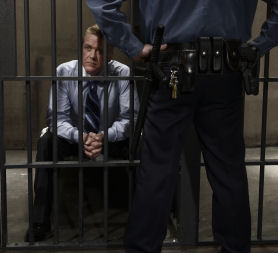Convicted prisoners to get vote
Tens of thousands of convicted prisoners in the UK are to get the right to vote after a European ruling found the present 140-year-old ban breaches human rights.

Since 1870, sentenced prisoners have not been allowed to vote in the UK.
But, on the advice of lawyers, the Coalition Government is set to confirm that it is ready to change the law to comply with a 2004 European Court of Human Rights (ECHR) ruling.
Prime Minister David Cameron is said to be “exasperated and furious” at having to remove the voting ban on Britain’s 70,000 prison inmates, but is being forced to do so rather than cost the taxpayer hundreds of millions of pounds in litigation costs and compensation.
There has been no official confirmation of the decision, but a senior Government source told The Daily Telegraph: “This is the last thing we wanted to do but we have looked at this from every conceivable angle and had lawyers poring over the issue.
“But there is no way out and if we continued to delay then it could start costing the taxpayers hundreds of millions in litigation.”
No vote for 140 years
Prisoners were stripped of the right to vote in the 1870 Forfeiture Act, which was upheld in the Representation of the People Act in 1983.
Prisoners on remand awaiting trial, fine defaulters and people jailed for contempt of court can all still vote. The change could mean that all prisoners will get the right to vote, but according to The Daily Telegraph, the Government is still considering whether the ban could be retained for murderers and others serving life sentences. Judges may get the responsibility for deciding who can vote when sentencing prisoners.
Juliet Lyon, Director of the Prison Reform Trust, said the change would mean the end of a prisoner’s “civic death” upon conviction.
“A historic decision to enfranchise serving prisoners would mark the end of the archaic punishment of civic death dating back to the Forfeiture Act of 1870,” she said.
“In a modern prison system you would expect prisoners to have rights and responsibilities and politicians to take an active interest in their constituency prisons.
“People are sent to prison to lose their liberty not their identity.”
Legal challenge
The change, expected to be signalled in a statement to the Court of Appeal at some point this week, will bring Britain in line with European law.
Following a legal challenge from prisoner John Hirst, who was convicted of manslaughter, the ECHR ruled the blanket ban was discriminatory and breached the European Convention on Human Rights. However, the court did rule that each country could decide which offences carried voting rights restrictions.
The previous Labour government had launched a number of consultations about changing the rights to vote for prisoners, but never changed the law. The Coalition was urged to act earlier this year by the Council of Europe.